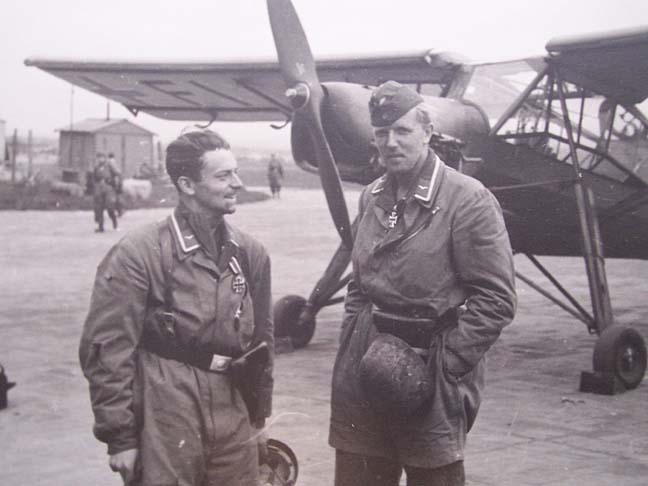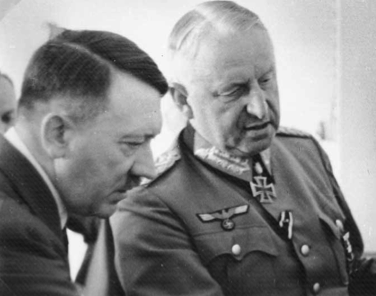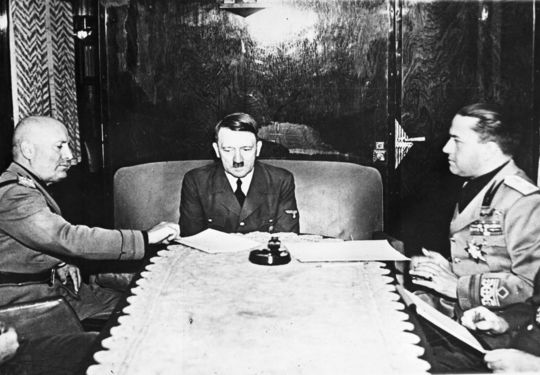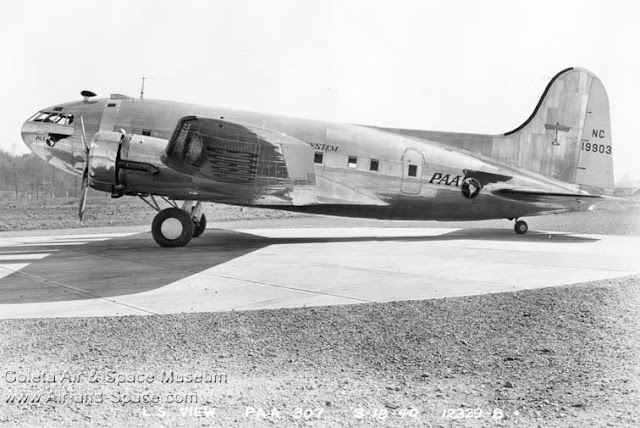Saturday 26 April 1941
 |
| Hitler in Maribor, 26 April 1941. With him are Martin Bormann and Otto Dietrich (Federal Archive). |
German paratroopers (Fallschirmjäger) stage Operation Hannibal (there were other operations of the same name). This is a brilliant military operation, but like many other such efforts during World War II, it achieves less in military terms than its brilliant execution might imply.
 |
| The view of the Corinth bridge taken by a Fallschirmjager on the approach to the drop zone, 07:00 on 26 April 1941. |
They seize the bridge over the Corinth Canal. The British, almost certainly informed of Operation Hannibal by Ultra intercepts, have artillery positioned and registered. The British manage an extremely lucky shot when a shell hits demolition charges that the Germans already have removed from the bridge and placed in a pile - but not actually taken off the bridge yet (a huge "rookie" error). The bridge, already in German hands, collapses into the Corinth Canal, preventing the Germans from bringing panzers across (once they arrive via Athens) until it can be replaced (which is not accomplished until the 28th). The fuel for the panzers, being brought to the Corinth Canal by a tanker, has to be re-routed to Piraeus and laboriously transferred into barrels which can be brought into the Peloponnesos. One British unit, the 4th New Zealand Brigade, is cut off east of the bridge, but it heads to Port Raphti on the Greek east coast for evacuation. The Germans only lose eight engineers in the operation, but the results barely even warrant that.
General Sepp Dietrich orders the LSSAH to cross the gulf by any means necessary, so the LSSAH commandeers every fishing trawler and coaster that it can find and so that it can gains a foothold on the Peloponnesos in conjunction with paratrooper landings at Corinth. This process begins today and continues on the 27th. While this is a fantastic technical accomplishment that enhances the reputation of the "Blitzkrieg," the crossing achieves less than might appear because the LSSAH (and paratroopers) cannot bring panzers, artillery, and other heavy equipment with them. The British, meanwhile, are not dependent upon Patras and the other ports of the Peloponnesos and are evacuating many troops from the east coast of the mainland and points south. Wehrmacht troops advancing south through Athens, in fact, are only a day or two away from the LSSAH foothold.
Other German troops on the mainland reach Missolonghi. During the night, the British continue Operation Demon, the evacuation of mainland Greece. The British Army and Royal Navy stage a furious evacuation from Athens beaches and take off the 16th and 17th Brigades from Kalamata and the 1st Armored Brigade - minus its vehicles. In all, the British take off over 20,000 men during the night:
- 4300 men were evacuated from Nauplia
- 8300 men were evacuated from Raphtis and Raphina
- 8650 men were evacuated from Kalamata.
The Luftwaffe bombs and damages 4917-ton British freighter Scottish Prince north of Crete. The freighter makes it to Alexandria under escort.
The Luftwaffe bombs and sinks Greek torpedo boat Kydonia at Morea.
The Luftwaffe bombs and sinks 1712-ton Greek freighter Maiotis in the Aegean. It is later raised by the Italians and taken to Trieste.
The Luftwaffe bombs and sinks 6303-ton Greek freighter Maria Stathatou at Mylos.
The Luftwaffe bombs and sinks 960-ton Greek freighter Zakynthos off Monemvasia.
 |
| The explosion of the bridge over the Corinth Canal, 26 April 1941. |
The Luftwaffe (KG 55) attacks Bristol and Liverpool (92 aircraft).
Luftwaffe pilot Wolfgang Falck, Kommodore of Nachtjagdgeschwader 1, attends a briefing in Hamburg (ironically bombed during the night). He learns about new airborne radar systems being developed, including the Morgenstern, Flensburg, and SN-2 (Lichtenstein) systems. The Nachtjagdfliegerdienst coincidentally scores its 100th night victory.
 |
| Another view of the explosion of the Corinth Bridge. |
Battle of the Atlantic: The US Neutrality Patrol now extends to the latitude line near Rio de Janeiro, Brazil. This frees up British escorts, who have had to move further and further west as U-boats and Kriegsmarine surface raiders extend their operations in that direction. US Navy aircraft carrier USS Wasp embarks from Hampton Roads along with support ships on a neutrality patrol in the Atlantic, the first time the US uses a carrier on Neutrality Patrol.
U-110 (Kptlt. Fritz-Julius Lemp) torpedoes and sinks 2564-ton British freighter Henri Mory in the Atlantic northwest of Achill Head, Ireland. There are 28 deaths and four survivors.
The Luftwaffe bombs and sinks 4648-ton British freighter Mountpark in the Northwest Approaches. There are six deaths.
Finnish 1172-ton freighter Lapponia hits a mine off Aalborg and sinks. It is later raised and repaired.
British 2217-ton collier Murdoch hits a sunken wreck and takes on water. It continues on but eventually sinks in the North Sea off Great Yarmouth at North Scroby Sand. The ship remains a navigation hazard throughout the war, remaining partially above water.
Convoy WS (Winston Special) 8A departs the Clyde. This includes several ships that will be included in the Tiger convoy past Gibraltar into the Mediterranean. The ships intended for Operation Tiger are:
- Clan Chattan
- Clan Campbell
- Clan Lamont
- Empire Song
- New Zealand Star.
Convoy OG-60 departs from Liverpool.
Canadian corvettes HMCS Nanaimo (K-101, H. C. C. Daubney) and Rimouski (K-121, Lt. John W. Bonner) are commissioned.
Royal Navy sloop HMS Erne (U-03, Lt. Commander Henry M. Darell-Brown) is commissioned.
U-432 (Kptlt. Heinz-Otto Schultze) and U-81 (Oberleutnant zur See Friedrich Guggenberger) are commissioned.
 |
| Wreckage of the Corinth Bridge in the Corinth Canal. This blocked the canal, which the Germans needed, but they cleared it within days. |
At Tobruk itself, the Australians stand firm, repelling German and Italian assaults and taking numerous prisoners. The Australians make some moves to widen their perimeter with tank and infantry advances, but the German artillery and panzers stop them cold. The German defense is aided by a sandstorm which "blew all day."
Prime Minister Winston Churchill sends a sharp cable to Commander of the British Mediterranean Fleet Admiral Andrew Cunningham. Churchill remarks to Cunningham that "you do not appreciate" British grand strategy in the Mediterranean (which is an odd thing to say to the man most responsible for implementing that strategy). Churchill further states that some of Cunningham's previous comments about strategy are "really not justified." There is a lecturing, churlish tone throughout the message which perhaps reflects the great difficulty the British forces in Greece are facing - an operation that was virtually solely Churchill's responsibility and which he ordered for political reasons against almost unanimous opposition in the military.
Royal Navy submarine HMS Upholder torpedoes and sinks German freighter Arta, which had been badly damaged in a destroyer action on the 16th and grounded on Kerkennah Bank off the coast of Tunisia.
Royal Navy gunboat HMS Ladybird bombards Gazala Airfield during the night, while gunboat HMS Aphis bombards the Italians in Halfaya Pass.
 |
| On the right is glider pilot Wilhelm Fulda. He was awarded the Ritterkreuz for his bravery at Corinth. |
Soviet Military: Soviet Chief of Staff General Georgy Zhukov orders a stealth mobilization of the Red Army to counter reports of German troop movements to the frontier area.
US Military: General Douglas MacArthur, from his command post in the Philippines, issues a plan for the seizure of New Britain, New Guinea, and New Ireland upon the outbreak of war. The objective would be to envelop the military base of Rabaul, currently in Australian hands but assumed to be in Japanese possession shortly after the outbreak of war. It is a far-sighted plan, but it requires the cooperation of the US Army and Navy - something that can be problematic at times.
German Government: Adolf Hitler has been camped in his command train "Amerika" in Austria throughout Operation Marita. Today, he takes his train from a little station near Graz (Monichkirchen) into Yugoslavia. He disembarks and proceeds by motorcar to Maribor (in German, Marburg). Here, he states:
Make this land German again for me.After a rapturous reception there (this is a pro-German province), Hitler gets back on his train and heads back to Graz for another happy welcome. Among other things, Hitler visits with his old history teacher, Professor Leopold Poetsch, who Hitler claims in "Mein Kampf" inspired his love of history.
 |
| Landing zones for Operation Hannibal. The operation went off without a hitch, with only one tiny flaw - the destruction of the bridge. |
One must observe that Menzies blows hot and cold on Churchill, and seems to blow the coldest when furthest away from him. About Hitler, however, Lloyd George is very complimentary, and (according to Menzies' diary) believes that "the Germans in their hearts like us much more than the French ever did." Naturally, this is the sort of attitude at this time that only an elder statesman could get away with, regardless of any merit it may hold.
Dutch Homeland: Potato rationing is instituted. Food supplies in The Netherlands will be stretched throughout the war - this is only the beginning.
 |
| The Luftwaffe's view of the Corinth Canal. |
April 1941
April 1, 1941: Rommel Takes Brega
April 2, 1941:Rommel Takes Agedabia
April 3, 1941: Convoy SC-26 Destruction
April 4, 1941: Rommel Takes Benghazi
April 5, 1941: Rommel Rolling
April 6, 1941: Operation Marita
April 7, 1941: Rommel Takes Derna
April 8, 1941: Yugoslavia Crumbling
April 9, 1941: Thessaloniki Falls
April 10, 1941: USS Niblack Attacks
April 11, 1941: Good Friday Raid
April 12, 1941: Belgrade and Bardia Fall
April 13, 1941: Soviet-Japanese Pact
April 14, 1941: King Peter Leaves
April 15, 1941: Flying Tigers
April 16, 1941: Battle of Platamon
April 17, 1941: Yugoslavia Gone
April 18, 1941: Me 262 First Flight
April 19, 1941: London Smashed
April 20, 1941: Hitler's Best Birthday
April 21, 1941: Greek Army Surrenders
April 22, 1941: Pancevo Massacre
April 23, 1941: CAM Ships
April 24, 1941: Battle of Thermopylae
April 25, 1941: Operation Demon
April 26, 1941: Operation Hannibal
April 27, 1941: Athens Falls
April 28, 1941: Hitler Firm about Barbarossa
April 29, 1941: Mainland Greece Falls
April 30, 1941: Rommel Attacks
2020









